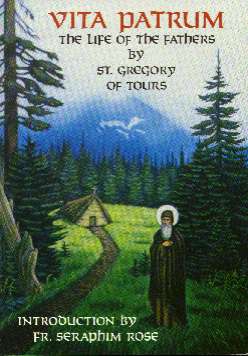
A Brief Overview of Vita Patrum
Why emphasize this book? Aside from the inestimable value of this original-source patrology (which appeared for the first time in English through the labors of the St. Herman Brotherhood), Father Seraphim wrote a very important "Prologue" to this book. In it he says:
From the beginning the Church has treasured the written Lives of these her saints and has celebrated their memory in her Divine services. These two sources—the Lives and services—are extremely important to us today for the preservation of the authentic Orthodox tradition of faith and piety. The false "enlightenment" of our modern age is so all-pervasive that it draws many Orthodox Christians into its puffed-up "wisdom," and without their even knowing it they are taken away from the true spirit of Orthodoxy and left only with the shell of Orthodox rites, formulas, and customs. Almost all Orthodox seminaries today (with the notable exception of Holy Trinity Seminary at Jordanville, New York) are centers for the propagation of modernism in the Church, and even when they cry "back to tradition" or "patristic revival," this is seldom more than another academic fashion, usually taking its inspiration from Roman Catholic scholarship, and leading not at all back to a truly Orthodox spirit, but only to yet more empty forms. To have a seminary education, even to have the "right views" about Orthodox history and theology—is not enough. A typical modern "Orthodox" education produces, more often than not, merely Orthodox rationalists capable of debating intellectual positions with Catholic and Protestant rationalists, but lacking the true spirit and feeling of Orthodoxy. This spirit and feeling are communicated most effectively in the Lives of saints and in similar sources which speak less of the outward side of correct dogma and rite than of the essential inward side of proper Orthodox attitude, spirit, piety. Very many of these basic Orthodox sources, already translated into English, are lying unused by Orthodox Christians because a proper Orthodox approach or introduction to them has not been given. Let us attempt here to make this approach, particularly with regard to the Orthodox saints of the West who are as yet so little known to Orthodox Christians in America, even though a number of them have been revered for centuries in the East. May this our effort be a fitting "prologue" (we shall see in a moment what this word means in Orthodox literature*) to a whole treasure-chest of Orthodox texts! May it help us all to put off our vain modern "wisdom" and enter more deeply into the spirit of Orthodox antiquity and its literature.
In the conclusion to his "Prologue" Father Seraphim writes:
It is our heartfelt wish that this book will take its place, together with the Dialogues of St. Gregory the Great, the Lausiac History of Palladius, and other BASIC ORTHODOX SOURCE-BOOKS, as part of the daily reading of those who are struggling for their salvation on the narrow Orthodox path. May it be read silently; may it be read aloud; may it become, like the other great books of Christian antiquity, a source of piety and the true spirit of Orthodoxy which is everywhere being overpowered today by the spirit of the world. May it help us in the all-important struggle to become and remain conscious Orthodox Christians, knowing what is the path of salvation, what is the savor of true Christianity, and how far we fall short of these. May it be for us a beginning, a prologue, of true Christianity in practice!

